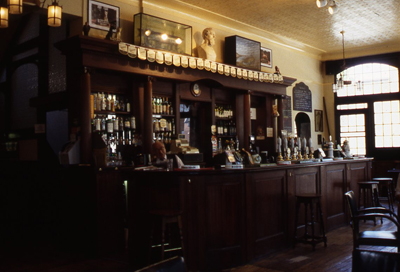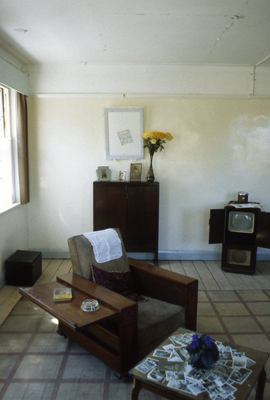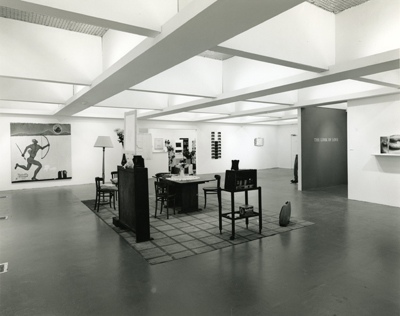The Look of Love
- The Look of Love - Press release
- The Silence of Love – Jean-Paul Martinon
- Here’s Looking at You – Peter Cross
- Today I Saw a Computer Lying Dormant – Patricia Scanlan
The Silence of Love – Jean-Paul Martinon
Rear Window Publications
1997 ISBN 0 9521040 7 5
© Jean-Paul Martinon
There is no denying it; the English are incapable of expressing feelings. They are stiff and unromantic. Stendhal and Angela Carter were right.
He said it in 1822:
“The modesty of women in England is the pride of their husbands. But however submissive a slave may be, her company soon grows burdensome, hence the fact that the men find it necessary to get gloomily drunk every evening, instead of passing the time with their mistress as in Italy.”(Stendhal, Love, translated by Gilbert and Suzanne Sale (London: Penguin, 1957), p. 147)
She said it at conference at the University of Pisa one hundred and seventy years later:
England is an “orgiastic not an ecstatic culture. The morning after the orgy comes a hangover; ‘never again’ we cry. But the morning after ecstasy comes enlightenment, and the desire to do it again as soon as possible.”(Angela Carter, Love in a Cold Climate, extract of a paper given at the University of Pisa, 1990)
It looks as if both abroad and “at home” everyone agrees that England is a puritanical northern protestant culture, which denies the power of language to communicate feelings.
So amongst the hangovers and through that supposedly stiff upper lip, how does love express itself under the rainy sky? Through silence. Not the stiff boredom of the old couple who have nothing left to say to each other, but that fleeting moment where no words can aggregate that intense emotion lovers feel for each other.
Emily Brontë understood the importance of this silence all too well: the entire relationship between Heathcliff and Catherine in Wuthering Heights is precisely based on that silence:
“‘You never told me, before, that I talked too little, or that you disliked my company, Cathy!’ exclaimed Heathcliff in much agitation. ‘It is no company at all, when people know nothing and say nothing,’ she muttered. Her companion rose up, but he hadn’t time to express his feelings further, for a horse’s feet were heard on the flags, and having knocked gently at the unexpected summons he had received.
Doubtless Catherine marked the difference between her friends as one came in, and the other went out. The contrast resembled hat you see in exchanging a bleak, hilly, coal country for a beautiful fertile valley; and his voice, and greeting were as opposite as his aspect—he had a sweet, low manner of speaking.”(Emily Brontë, Wuthering Heights (London: Penguin, 1995), p. 69)
The bleak, hilly country is the field of love as silence: real passion which does not allow any leafy small talk, true love that survives the passing of seasons.
It’s bleak, but it’s also stormy. When Catherine dies in the presence of Heathcliff, she needs to wait until the storm of passion has passed to finally resume her thoughts and give up her life:
“‘I shall not be at peace,’ moaned Catherine, recalled to a sense of physical weakness by the violent, unequal throbbing of her heart, which beat visibly and audibly under this excess of agitation. She said nothing further till the paroxysm was over, then she continued, more kindly…”(Brontë, Wuthering Heights, p. 159)
That short lapse of time when words stop their course express everything love can say because essentially, it is a communion, a common understanding. Virginia Woolf said it in To the Lighthouse, when Mr and Mrs Ramsay, sitting as they did every evening on their holidays on the island of Skye, couldn’t come to terms with using words to describe their feelings for one another:
“He wanted something—wanted the thing she always found difficult to give him; wanted her to tell him that she loved him. And that, no, she could not do. … Then, knowing that he was watching her, instead of saying anything she turned, holding her stocking, and looked at him. And as she looked at him she began to smile, for though she had not said a word, he knew, of course he knew, that she loved him. He could not deny it. And smiling, she looked out of the window and said (thinking to herself, Nothing on earth can equal this happiness)–
‘Yes, you were right. It’s going to be wet to-morrow.’”(Virginia Woolf, To the Lighthouse (London: Penguin, 1992, p. 134)
But the English have a sense of humour. Silence when it hovers for too long becomes unbearable, and the English of course, have to turn it (and therefore themselves) into a parody. The campy 1940s film Brief Encounters is the epitome of the English “silent” love film. When Alec (Trevor Howard) and Laura (Celia Johnson) admit to each other the fact that they’ve fallen in love, the camera emphasises the importance of that typical English silence to the point of absurdity, as if we hadn’t understood, that, sorry, it’s too much, she can’t express it: while he looks at her, the camera looks down on her over his shoulder; she is held by his gaze, charmed, transfixed, and pressurised all at once, suggesting as Richard Dyer intimates in his analysis of the film, a gamut of anxieties, misgivings, unwelcome insights.
Let’s not deceive ourselves; anxiety is quintessential in that silent English way of loving; it suggests discourses that cannot be expressed, endless and impossible narratives that would have sent the French and the Italians into a plethora of debates and agitated recitatives.
And what happens when an English person meets an over-expansive continental with a dilated upper-lip? Silence? The mutual perplexity over one’s another’s cultural idiosyncrasies? It seems that beyond cultural differences, silence remains, oddly enough, the most important “form of communication” between lovers. Neil Bartlett, in his novel, Mr. Clive and Mr. Page, breaks down both linguistic and amorous borderlines and allows two lovers, and Englishman and somebody “who barely speaks Berlitz School English,” to consummate their romance without uttering a word:
“Mr. Clive reaches up into Gabriel’s hair, not pulling him down or to force him, but just for the pleasure of seeing his own hand resting at last in that strange white hair. Still nothing has been said, and indeed Mr. Clive doesn’t know what to say; but he agrees to everything. And now the real shame begins; the words and whispers of one syllable begin to be heard, the words that sound almost the same in both their languages, yes, no, Christ.”(Neil Bartlett, Mr. Clive and Mr. Page (London: Serpent’s Tail, 1996), p. 153)
No, there is no denying it: forget Puccini’s melodrama, Stendhal’s romantic novels, Pablo Neruda’s erotic love-poems, Cole Porter’s languid American songs; nothing equals a true English silence. After all, this should be a lesson for the world: who better than the English have understood through their silent gazes and tight lips that no words can express the unexplainable: love. Love, this mysterious thing that that always should remain silent, especially when we are desperately fighting to find words that surreptitiously always to bring us back to the reality of a daily life.





